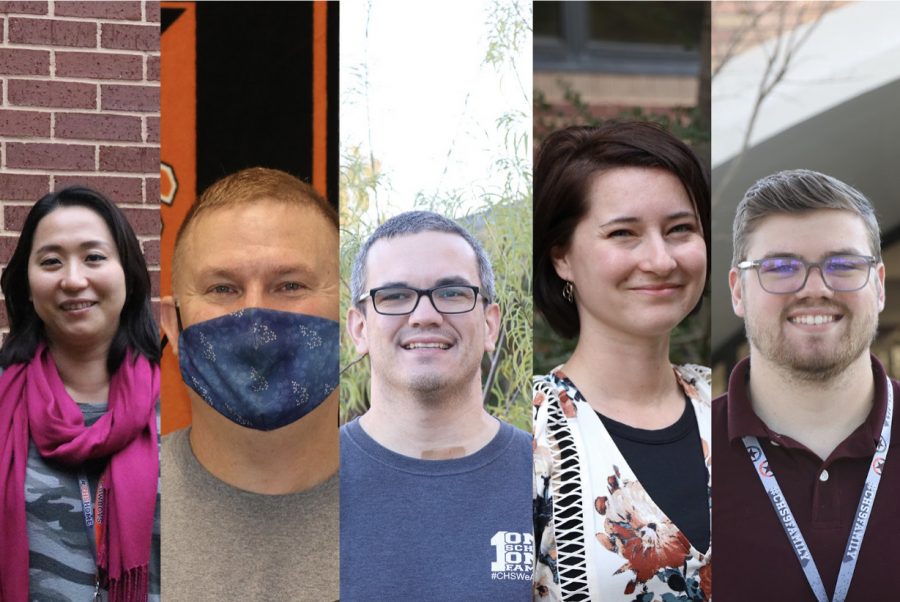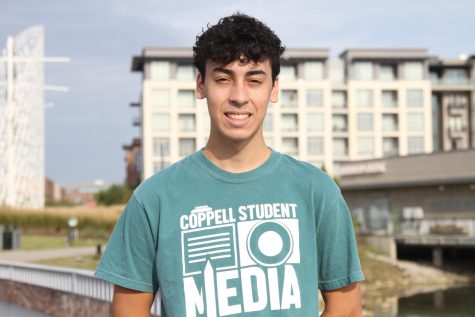Asking teachers: Career advice from top educators
Due to COVID-19, school has changed a lot this year and has been difficult for some. Coppell High School teachers give advice on finding a career and navigating through these times of struggle.
December 17, 2020
When we were younger, our elementary teachers usually asked us this question: what do you want to be when you grow up? The answer to this question was easy: we wanted to be the astronaut that floated in space, the adventurer that roamed the rainforest or the pilot that soared the skies. The possibilities seemed endless, and the sky was never far out of reach.
However, we get older, reality feels harsher, the pressure is immense and that sky that seemed so near? It is billions of lightyears away. Some of us don’t know where we want to go in life, or, if we do, how we’re going to get there. The future that seemed so bright is shadowed by reality.
Our teachers have also gone through these struggles in choosing a career path. All of them discovered their love for teaching.
Advice from CHS9 English teacher Christopher Arney:
Arney knew he wanted to be a teacher since third grade, and aside from a few minor deviations, it has stayed that way. He originally wanted to teach science before deciding on English in high school after he realized how much math is involved.
What advice would you give to students who want to follow their dreams?
Do something that you are actually going to enjoy because if you do a job that you hate every day, it’s going to be very stressful. You will work more than you see your family. I work more than I see my own dog and wife. So, if I hated my job every day then I would be miserable. Find something that you actually want to do and makes you happy as opposed to something that’s just going to make you a ton of money.
Advice from Coppell High School art teacher Michelle Hauske:
Hauske always knew she wanted a career in art, and despite always wanting to help others and enjoying teaching peers, it never occurred to her to teach until later on. After college, she worked at Detroit Institute of Arts where she was a tour guide in the museum. She realized that she enjoyed the interactions she had with others and teaching people information about art, so she decided to combine her love for visual arts and human interaction in teaching.
What advice would you give to students who have a career field but do not know where they are going with it?
My best advice is interning. You can’t really know what the job is going to be like unless you intern. Getting some real world experience is important and then staying open minded. It’s important to research careers. It’s hard to know what you want to do and there are so many creative careers, but it’s also competitive. You need to think about what your end goal is. It’s really common when you go into college to change your degree plan. I know that a lot of high school students are going through college applications and trying to get accepted. They are concerned that the decision they make is going to impact the rest of their life, and it does, but a lot of times people will go into school and then once they’re in the university, they change their career paths.
Advice from CHS AP computer science teacher Michael McCabe:
McCabe was the first person in his family to graduate from high school. He applied for one college, the University of Texas at Dallas and was accepted. Not knowing anything about financial aid, he then went to Eastfield College, a community college in Dallas County for two years. Working three jobs to get by, he joined the U.S. Air Force at 21 and spent four years in the military. After that, he jumped from job to job, and he completed his degree as a contingency for a promotion, and when that company let him go , he decided that he wanted to teach.
What advice would you give students who do not know what they want to do in life?
Everything will turn out OK. Where you end up is where you’re supposed to be. I have a path different than most. Just because we don’t get into Harvard or Yale or most places of our choice, the most important thing is pursuing it. Get out there and put your best foot forward. You have no idea what you’re going to do. I wanted to be a scientist and I wanted to play baseball, neither of which happened. But I wouldn’t change my path. Always do something that makes you happy.
Advice from CHS9 honors geometry teacher James Behlen:
Behlen’s interest in geometry and teaching is what led him to teaching. He received a near perfect score in his high school geometry class and enjoyed helping people out. At first, he pursued a general engineering degree in college before deciding to major in math.
How did you know if you choose the right job?
This year is a very hard year for teachers because our job has turned into the type of jobs we all decided not to do. We stare at computer screens; we sit. The whole draw of teaching is you can build relationships with people, be a positive role model for students and help people make better choices. That’s the number one reason people want to be a teacher and a lot of that’s absent this year. This year [with COVID-19 and virtual learning] is [telling me that] I’m doing the right job.
Advice from CHS Chinese teacher Andrea Voelker:
Growing up in Taiwan, Voelker did not want to become a teacher. Voelker wanted to be an ambassador or diplomat because of the travel experiences, and eventually, she got a masters degree in business. After working four or five years in business, her husband Garrett Voelker, who is a world history teacher at New Tech High @ Coppell encouraged her to be a teacher.
What advice would you give to students who do not end up using their degree in the future?
Even though I’m in something different than what I [majored] in, I found the career I wanted to be [in]. This is a job I really enjoy. If you are a person that [knows] what you want to become in the future – that’s great because a lot of us don’t know what we want to be, even after [graduating] from college. I’m fortunate I chose what I thought was fun and it turned out [to be] my passion too. [My mentor, a principal from Fort Worth Chinese School, Aaron Chang] taught me something: “Do what you love, the money will come. If the money doesn’t come, at least you’re doing what you love.” We should all pursue what we want. A lot of people would [give up] their passion and do what they don’t like. And maybe I don’t make a fortune but I’m happy with my work, [and] I have a passion. I’m doing what I love. I’m an ambassador of Chinese culture to my students.
Follow Iniya (@iniya_v) and @CHSCampusNews.











